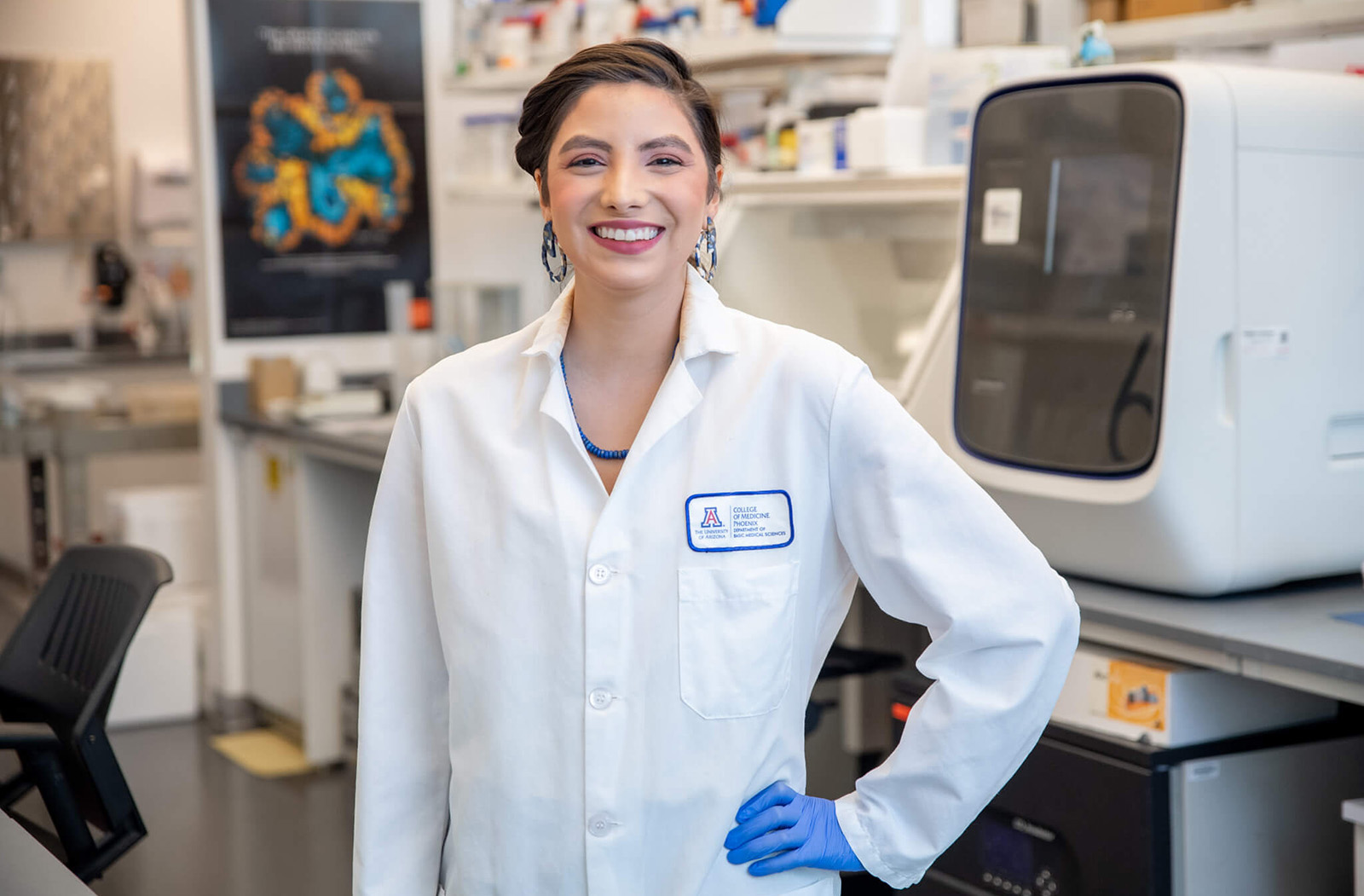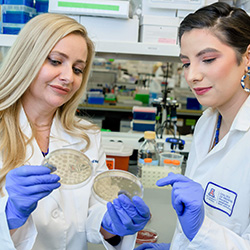
Postdoctoral Fellowship Awarded to Researcher Focused on Women’s Health

Nicole Jimenez, PhD, a postdoctoral research associate in the Department of Obstetrics and Gynecology (OB/GYN), was recently awarded the two-year Sidney Hopkins, Mayola B. Vail and Patricia Ann Hanson Postdoctoral Fellowship from the Community Foundation of Southern Arizona.

“We hypothesize that there are different cancer-causing contributions amongst these three novel vaginal bacteria,” Dr. Jimenez explained.
Her goals for the project are twofold: 1.) analyze the “cancer-causing” potential of these newly identified bacteria using a well-characterized 3-D human endocervical cell model; and 2.) evaluate the clinical phenotypic presentation and microbiome relationship of these novel bacteria in two diverse previously collected cervical and endometrial cancer cohorts.
In doing so, Dr. Jimenez hopes to, “Impact early diagnostics and future clinical care of gynecologic cancers and provide insight into potential oncogenic mechanisms of bacteria that inhabit the cervicovaginal environment.”
This line of research has always been of interest to her. Since 2015, she has actively championed research on key vaginal bacterial species in reproductive health. In 2021, she defended her PhD in Microbiology and Immunology at Virginia Commonwealth University (VCU).
While there, her research centered on the microbiome, which she conducted with VCU’s Vaginal Microbiome Consortium. The comparative genomics of cervicovaginal bacteria — especially Bifidobacterium species — helped her identify correlations between the cervicovaginal microbiome in reproductive health and disease, and the maternal-infant microbial transmission and toddler health progression.
This work ultimately led her to the lab of Melissa Herbst-Kralovetz, PhD, an associate professor of Basic Medical Sciences and Obstetrics and Gynecology at the College of Medicine – Phoenix. Dr. Jimenez is a key member of her research team, as well as the Women’s Health Research Program (WHRP) and Women’s Health Microbiome Initiative (WHMI) — both of which Dr. Herbst-Kralovetz leads.

For Jimenez, the mentorship Dr. Herbst-Kralovetz has provided has been invaluable. “Being around such a dynamo has really inspired me to continue in this field where I can carve out a chunk of my experiences and her expertise to make some really cool science happen,” she said.
With the goal of one day running her own lab at a research-intensive institution studying the role of the microbiome in women’s health and disease, working with Dr. Herbst-Kralovetz has been transformative. It has allowed her to gain a greater understanding of cancer-causing microbes and their relationship within the vaginal, endometrial and rectal microbiomes, as well as to improve her skillset with advanced multiomic analysis.
She credits their use of 3-D cell culture model pipelines with better understanding the pathophysiological mechanisms of key bacteria; and she noted their utilization of microbiome, metabolomics and immunoproteomics as providing an encompassing view of the cervicovaginal microenvironment.
Dr. Jimenez expressed confidence that working with Dr. Herbst-Kralovetz will help her future goals come to fruition. “My overall hope is that my experience in multi-disciplinary research will allow me to substantially contribute to the field of women’s health. I intend to leverage my growing skill set to bridge the gap between wet lab science and clinical research, improving and expediting therapeutic and clinical care solutions — especially for underrepresented communities and understudied conditions,” she said.
About the College
Founded in 2007, the University of Arizona College of Medicine – Phoenix inspires and trains exemplary physicians, scientists and leaders to advance its core missions in education, research, clinical care and service to communities across Arizona. The college’s strength lies in our collaborations and partnerships with clinical affiliates, community organizations and industry sponsors. With our primary affiliate, Banner Health, we are recognized as the premier academic medical center in Phoenix. As an anchor institution of the Phoenix Bioscience Core, the college is home to signature research programs in neurosciences, cardiopulmonary diseases, immunology, informatics and metabolism. These focus areas uniquely position us to drive biomedical research and bolster economic development in the region.
As an urban institution with strong roots in rural and tribal health, the college has graduated more than 1,000 physicians and matriculates 130 students each year. Greater than 60% of matriculating students are from Arizona and many continue training at our GME sponsored residency programs, ultimately pursuing local academic and community-based opportunities. While our traditional four-year program continues to thrive, we will launch our recently approved accelerated three-year medical student curriculum with exclusive focus on primary care. This program is designed to further enhance workforce retention needs across Arizona.
The college has embarked on our strategic plan for 2025 to 2030. Learn more.